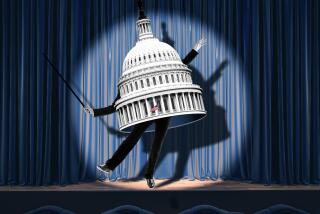Helms’ NEA Plan Heads for Stiff Resistance : Art: Activists are determined to fight a rider that the senator has attached to the agency’s appropriations bill banning ‘patently offensive’ work.
- Share via
An attempt by Sen. Jesse Helms (R-N.C.) to prevent the National Endowment for the Arts from funding “patently offensive” art will run into stiff lobbying resistance on Capitol Hill this week, according to leaders of several human rights and arts activists groups.
While lawmakers race the clock to finish work on the 1992 federal budget before an Oct. 1 deadline, Helms’ foes--including People for the American Way and the National Campaign for Freedom of Expression--are already mustering to defeat a rider Helms attached to next year’s NEA appropriations bill. The rider, which was approved by a 68-28 Senate vote Thursday, forbids the NEA from making grants to any artist whose work shows sexual or excretory functions or organs in a way that is “patently offensive.”
“Jesse Helms’ NEA would be barred from funding Michelangelo’s David,” said People for the American Way’s Arthur Kropp. “Even the artwork in many of Washington’s public buildings would be forbidden.”
David Mendoza, executive director of the National Campaign for Freedom of Expression, pointed to the similarity between the proposed NEA ban and a ban on broadcast language that was “patently offensive” that Helms engineered in 1988. In that effort, aimed at curbing “indecency” on the nation’s airwaves, Helms also attached his proposed ban to an appropriations bill just before the beginning of a federal fiscal year.
The indecency ban was challenged by more than a dozen organizations, including People for the American Way, and was subsequently found unconstitutional by the U.S. Court of Appeals in Washington in May of this year.
For the arts activists, the next step will be to lobby the two dozen senators and representatives who will be selected this week to sit on a joint House-Senate committee considering the final form of the 1992 appropriations bill.
“We will now focus our attention on the conference committee and fight vigorously along with others to have the Helms language removed,” Mendoza said. He said the American Council on the Arts, National Gay and Lesbian Task Force, GLAAD and the Human Rights Campaign Fund would be among those fighting the amendment.
A second Helms effort was aimed at increasing the percentage of NEA funds that are given to state arts councils. Before he withdrew that measure for lack of support, Helms complained that the bulk of NEA funding always seemed to go to large urban areas such as New York, Los Angeles and San Francisco.
More to Read
The biggest entertainment stories
Get our big stories about Hollywood, film, television, music, arts, culture and more right in your inbox as soon as they publish.
You may occasionally receive promotional content from the Los Angeles Times.









